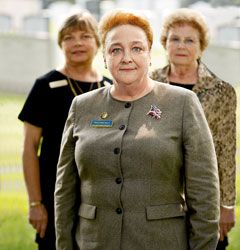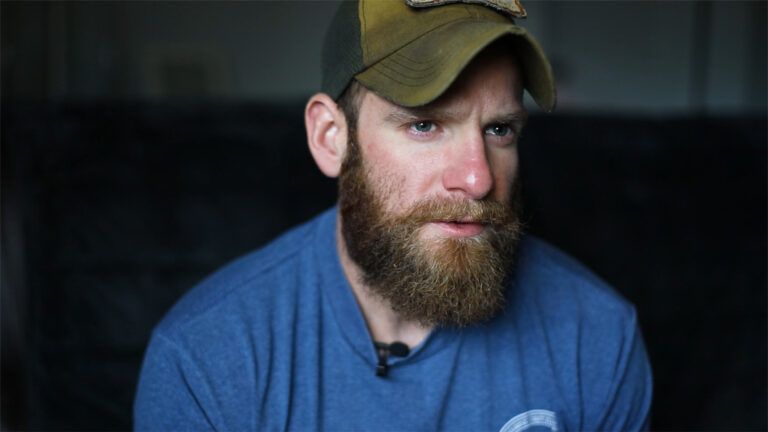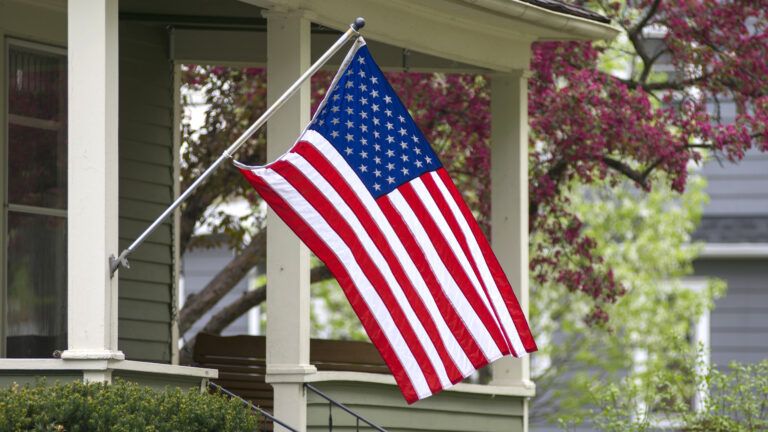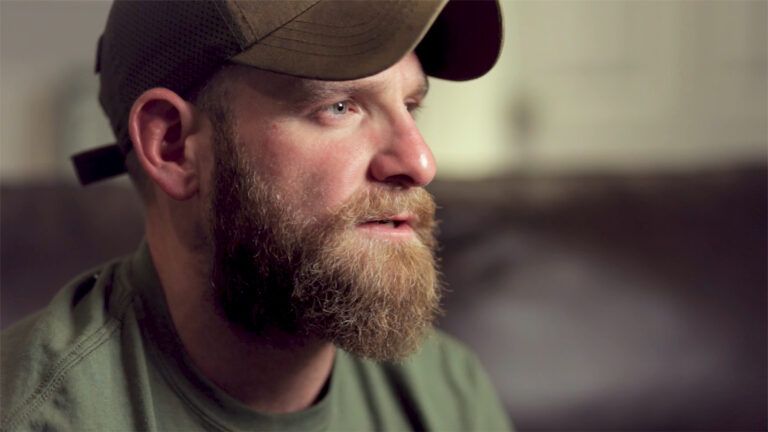The widow flew alone from Orlando. The only fare she could afford required two stops before landing in Washington, D.C. The trip took nearly a day. She rode in a cab to Arlington National Cemetery, holding her husband’s ashes in a wooden box on her lap.
Before her husband died suddenly, she had been looking forward to a long, happy retirement. Her husband had begun building a deck behind their house. They had no children, and their only surviving family lived in Peru. But they had each other. Now she had no one.
She might have attended her husband’s funeral by herself. But he had retired after 20 years as a senior Navy technician.
And so, when she arrived at Arlington, she was met by a woman named Paula McKinley, whose mission it is to ensure that no one in the United States military’s large extended family is left to endure the death of a loved one alone.
Paula is an Arlington Lady, one of about 150 women who volunteer to stand by the freshly dug graves of American soldiers and veterans, comforting survivors, and, when there are no survivors, embodying the military’s commitment to never abandon its dead.
The women—wives and widows of servicemen or retired from the service themselves—are all busy. Some work full-time. Yet they are drawn to the Arlington cemetery because “everyone who has served in the military is a hero,” says Paula. “It is without a doubt the most gratifying volunteer work I’ve ever done.”
When Paula arrived for the Orlando technician’s ceremony, she found his widow in a cemetery waiting room, cradling a picture of her husband. The wooden box with the sailor’s ashes had been given to an attendant. Paula introduced herself and put her arm around the widow.
“She buried her head in my shoulder and she didn’t say anything for five minutes. Then she looked at me and said, ‘I’m so sorry.’ And I said, ‘For what? You have every right to cry.'”
Paula stood by the widow while her husband’s ashes were interred. When a sailor handed the woman a folded flag, she again cried on Paula’s shoulder. The next day, Paula drove her to the airport. “I didn’t want her to be by herself,” she says.
The Arlington Ladies began attending funerals in 1948, when Gladys Vandenberg, wife of the Air Force Chief of Staff, noticed airmen being buried without any mourners, says Linda Willey, chair of the Air Force Arlington Ladies.
Troubled, Mrs. Vandenburg enlisted members of the Officers Wives Club to attend funerals that were otherwise unaccompanied. Soon after, the women offered to attend all funerals—to give comfort and to present condolence cards from the entire Air Force family.
After the service, the women wrote letters to any survivors who couldn’t make it to Arlington, reassuring them that their loved one was buried with dignity.
Army wives inaugurated their own Arlington Ladies branch in 1973, which is now chaired by Margaret Mensch. Navy wives followed suit in 1985.
“You can’t understand what these survivors have gone through in their lives unless you’ve experienced the same,” says Paula, who began serving in 1991, when she and her husband, David, a Navy captain, returned from an extended deployment in Japan and the Philippines.
As a Navy wife, Paula believes she knows a widow’s loneliness. During the years her husband was deployed, she sometimes woke up Christmas morning to find she was the only one in the house.
It was “the loneliest feeling I’ve ever felt in my life,” she says. “It gives me empathy with a widow. She wakes up every morning without her husband.”
Arlington holds 25 to 30 funerals every day. Veterans who have been given an honorable discharge are entitled to have their ashes put in the columbarium. Soldiers retired from extended service are entitled to a ground burial.
Although Arlington conjures images of full-dress funerals with a horse-drawn caisson and honor guard, most ceremonies are simple, with a chaplain, survivors and a few casket bearers.
Paula, who chairs the Navy Arlington Ladies, has attended burials for Marines and Navy SEALS killed in Iraq, and a Navy officer killed at the Pentagon on September 11, 2001. “It can be heartbreaking to see the young ones,” she says.
Sheila Brown, secretary to Arlington’s Navy chaplain, Ronald Nordan, has seen many widows comforted by the Arlington Ladies later become members of the group themselves.
That’s because Arlington Ladies keep in touch, sometimes forming friendships with the men and women they comfort. Once, Paula got a call from a widow in Pennsylvania distraught that she couldn’t make it to her husband’s grave on their wedding anniversary.
The couple had been so in love that, even when the husband was far out to sea, they had arranged times to look at the full moon. He would stand on deck, she in her yard, and both knew what the other was seeing. On anniversaries, the husband always sent a red rose.
Paula went to her yard, took three roses from her own garden and went down to the cemetery, where she placed them on the sailor’s grave and took pictures to send to the Pennsylvania widow.
Paula says she knows that, one day, either she or her husband will be accompanied by an Arlington Lady.
“It’s the closeness that we have,” she said. “That’s why I’m an Arlington Lady. I’m part of a military family.”




